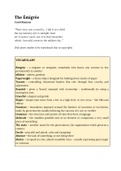Summary
Summary 'The Émigrée' by Carol Rumens - Poem Analysis
- Course
- Institution
Here’s a detailed analysis of the poem ‘The Émigrée’ by Carol Rumens. These notes are tailored towards students from Y9 to A-Level (age 13+), including being suitable for collections such as AQA Power and Conflict Poetry. It includes, but is not limited to: Vocabulary Summary Langua...
[Show more]




